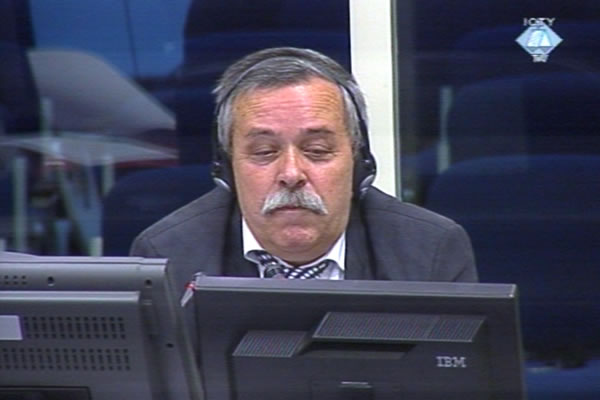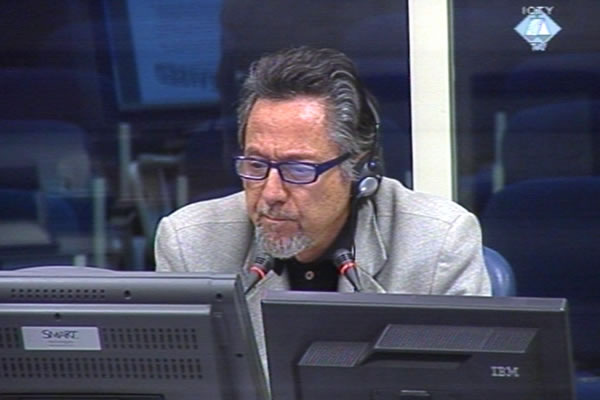Home
ONE-EYED INVESTIGATIVE JOURNALISM
Former chief of the Drina Corps Information Service Zoran Jovanovic contends that he ‘conducted journalistic investigations’ and he established the identity of those who committed the crimes against Serbs in the villages around Vlasenica. At the same time Jovanovic didn’t find out who was responsible for the destruction of the town mosque despite the fact that he personally captured the event on camera. The witness was likewise unable to learn anything about the crimes against Muslims in the Susica prison camp although he visited it during the war at least once
 Zoran Jovanovic, defence witness of Radovan Karadzic
Zoran Jovanovic, defence witness of Radovan Karadzic The trial of Radovan Karadzic continued with the evidence of Mario Andolina, an Italian specialist for bone marrow transplantation. In his statement to the defense, Andolina says that in 1993 he arrived in BH to help treat the children. Andolina met Karadzic and was allowed to remain in Republika Srpska. During the next six months Andolina and Karadzic met several times. Andolina contends that the accused expressed his ‘concern for the suffering of children of all ethnicities’. The witness said that Karadzic allowed him to treat Muslim children in the RS territory. In 1994, Karadzic allowed Andolina to pass through territories under Serb control to get to Bihac.
In the cross-examination, the prosecutor focused mostly on the credibility of the witness, noting that the Pale leadership used him for propaganda. Andolina was given a medal, the Order of Nemanjic, for improving the Bosnian Serb humanitarian image. The witness confirmed that in September 1995 he met with Ljubisa Beara, the security chief in the VRS Main Staff, but he contested the entry from Beara’s diary which says that Dr Andolina suggested that he should personally take custody of the captured French pilots ‘once the Serbs have no use for them anymore’. The witness admitted that during the war a police official from Zvornik gave him a list with the names and addresses of ‘Arab fundamentalists’ in BH. The witness handed the list over to the Italian authorities but they ‘dismissed it as irrelevant’.
After the Italian doctor completed his evidence, Karadzic called Captain Zoran Jovanovic, a Serb journalist from Vlasenica who was the head of the Information Service in the Drina Corps during the war. The summary of Jovanovic’s statement was almost identical to the statements of other witnesses from Vlasenica Karadzic has called so far. The witnesses pointed the finger of blame squarely on Muslims for the outbreak of the conflict and the war crimes in that municipality. Jovanovic said that Muslims were the first to obtain arms and the only thing Serbs could do was to capture Vlasenica with military force and set up their government.
Despite numerous warnings that crimes he is charged with cannot be justified by the crimes of the other side, Karadzic showed in court several video recordings of Serbs who had been killed and Serb villages that had been burned. The witness’s cameraman recorded the footage during the war in BH. The accused contends that such attacks – and not his public appearances – sparked the Serbs’ reaction. It was then ‘difficult to prevent’ the Serb crimes, Karadzic argued. The presiding judge reprimanded Karadzic for wasting time and presenting irrelevant evidence in pursuit of ‘tu quoque defense’.
The witness said that through his ‘journalistic investigations’ he established who was responsible for the murder of Serbs in various villages in the Vlasenica area. Although he gave the evidence to the BH prosecutors, nobody has been prosecuted. However, his investigative journalism failed when it came to the crimes committed by the Serb side. In the cross-examination, the prosecutor put it to the witness that the VRS engineering units destroyed the Hajrija Town Mosque in August 1992. Although he captured the event on camera, Jovanovic replied that he ‘tried to enquire’ about the identity of the culprits but has not been able to learn anything. The Drina Corps journalist didn’t have any information about the brutal beatings, rapes and murders of Muslim civilians detained in the Susica prison camp despite the fact that prison camp commander Dragan Nikolic Jenki had pleaded guilty to the crimes before the Tribunal. Jovanovic said that he only visited the Susica prison camp once during the war. The detainees told Jovanovic they ‘are well and that nobody has touched them’. The prosecutor confronted Jovanovic with the report detailing the health status of a Muslim woman who stated that Jenki raped her in Jovanovic’s presence. The witness replied that it was an ‘absolute lie’.
Radovan Karadzic’s trial continues on Tuesday.
Photos
Linked Reports
- Case : Karadzic
- 2013-02-20 SAFE CONDUCT FOR BOZIDAR VUCUREVIC
- 2013-02-20 BIRMINGHAM ‘CLOSER’ TO SREBRENICA THAN ZVORNIK
- 2013-02-19 VLASENICA ‘ORIGINALS OF FORGERY’
- 2013-02-26 KARADZIC’S MOTION FOR SUBPOENA TO FIKRET ABDIC DENIED
- 2013-02-26 A WITNESS FOR ALL SEASONS
- 2013-02-27 ‘IMPLAUSIBLE’ AND ‘LESS IMPLAUSIBLE’ SREBRENICA ALLEGATIONS

